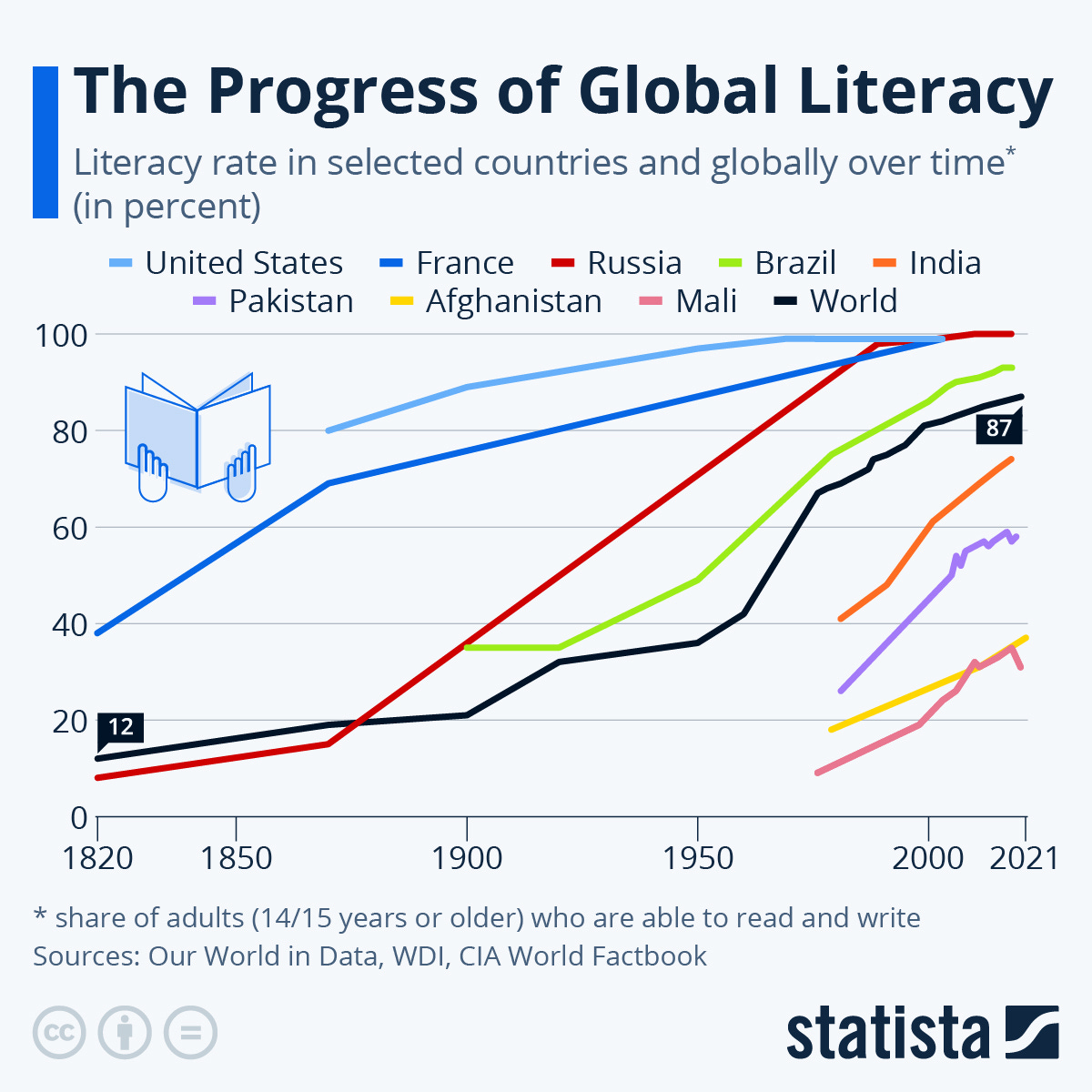Literacy: What it is and what does it mean today
How soon will it be redefined

According to Wikipedia, Literacy is defined as the ability to read and write.
However, reading and writing aren’t as new inventions as their global measurement practices.
The ability to grasp and express ideas has been a core part of knowledge for centuries. The ability to read and write are chosen as outward manifestations of those two core abilities of a freethinking human being.
It’s only in the last couple of centuries that developed countries have begun to measure it.
Here is the movement chart of world literacy from 1820.

A few standouts:
Global South’s (loosely, Asia, Africa, and South America) literacy journey began only in the 20th century.
Yet, it progressed at a much better rate compared to developed Europe and North America.
Developed countries (especially the US) began to work on literacy quite early, coinciding with their later economic supremacy. While their literacy growth curve has been gentle, the spread of literacy has been organic, and hence self-sustaining.
That explains why developed nations have kept redefining literacy beyond the mere ability to read and write alphabets and words. The resulting strengthened tie between learning and economic growth is quite apparent.
To elaborate, developed nations (not necessarily current ones) define literacy as the ability to comprehend thoughts, mold them, form new ones, and express them in a much fine-grained manner.
Alvin Toffler explained this constant unease in his work Future Shock in 1970.
The illiterate of the twenty-first century will not be those who cannot read and write, but those who cannot learn, unlearn, and relearn.
This was at a time when the Cold War arms race was in full swing, and technological advancements in computing + communication were opening up new possibilities. US public education got an overhaul via freshly injected government reforms. The era of scientists and academicians was at its zenith. A generation of technology entrepreneurs were still in the cradle.
Contrast this with today: Scientists and academia are mostly sidelined from public discourse. Entrepreneurs rule and control the public narratives through social and commercial media.
The idea of success is no longer associated with discoveries and the invention of ideas, but with the amount of funding a tech application receives—an application, that is a mere permutation out of 10000 possible ones sprouting from singleton scientific breakthroughs.
The problem of the 20th century was to make masses read and write - primarily through alphabets. Today, this is no longer the case. Looking at the world through the AI + social media lens, comprehending and interacting with the immediate world is possible even if you don’t know how to read and write. However, the quality of such comprehension and interactions is debatable.
When reading was established as an important benchmark of literacy, puritans bumped their fists emphasizing discernment: What you read matters more than how much or how fast you read.
Today, this discernment has to take a backseat, because reading competes with other media forms. To most, it is a means to an end: Comprehension. And if audio and video can provide it, why face the uphill task of going through huge chunks of mentally taxing alphabets?
To say reading might make a comeback would be an optimism. Glancing over your newspaper app or skimming over your email program provides enough exercise to the mental muscles responsible for decoding. Comprehension can choose TikTok for a foot in the door leading to your shrinking brain.
If the 21st century is supposed to belong to technology, where is the rigor to choose evidence-backed methods to comprehend the world? If there is research that shows audiovisual can replace reading instead of augmenting it, I have yet to see its widespread application. Are governments (and private stakeholders of education) delving into deeper questions regarding the need to redefine literacy? Or are they simply buying shiny EdTech’s proof of concepts?
Am I worried that we are losing our ability to read and write? Not quite. However, I am concerned about losing our ability to access some of the cognitive pathways reading can trigger. According to Dr Michael Mosley’s BBC radio episode, reading even has unexpected benefits for longevity. We need much more than these isolated strands of hope, especially in days when AI machines are quickly becoming the middleman to our collective consciousness stored as text, in books - feeding off of it all the while.
The fallout? After some years, the world will define literacy as the ability to rehearse sentences from a video or podcast. If Toffler were alive today, he might see his definition of the illiterate reversed within a century:
The illiterate of the twenty-first century will
notbe those who cannot read and write

